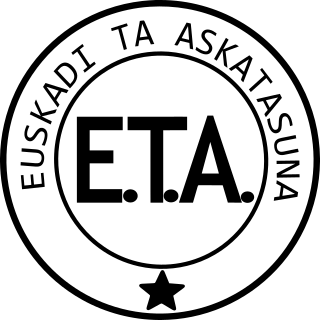
ETA, an acronym for Euskadi Ta Askatasuna, was an armed Basque nationalist and far-left separatist organization in the Basque Country between 1959 and 2018, with its goal being independence for the region. The group was founded in 1959 during the era of Francoist Spain, and later evolved from a pacifist group promoting traditional Basque culture to a violent paramilitary group. It engaged in a campaign of bombings, assassinations, and kidnappings throughout Spain and especially the Southern Basque Country against the regime, which was highly centralised and hostile to the expression of non-Castilian minority identities. ETA was the main group within the Basque National Liberation Movement and was the most important Basque participant in the Basque conflict.
Batasuna was a Basque nationalist political party. Based mainly in Spain, it was banned in 2003, after a court ruling declared proven that the party was financing ETA with public money.

Baltasar Garzón Real is a Spanish former judge. He served on Spain's central criminal court, the Audiencia Nacional, and was the examining magistrate of the Juzgado Central de Instrucción No. 5, which investigates the most important criminal cases in Spain, including terrorism, organised crime, and money laundering. In 2011, he was suspended from judicial activity and in 2012 he was convicted of illegal wiretapping and disbarred for a period of 11 years. During this time, Garzón legally assisted Julian Assange. In the landmark case Baltasar Garzón v. Spain (2021), the United Nations Human Rights Committee found that Garzón's trial in Spain was "arbitrary" and violated the International Covenant on Civil and Political Rights.

Gara is a bilingual (Basque/Spanish) newspaper published in the city of Donostia-San Sebastián in the Basque Autonomous Community. The newspaper's target market comprises the area of the Basque Country, but its circulation is largely constrained to the Southern Basque territory (Spain), since Spanish is mainly used.

The Communist Party of the Basque Homelands was a communist Basque separatist party in the Basque Country, Spain. The party was outlawed by the Spanish Supreme Court in 2008 after it was judicially proven to be part of Batasuna and, therefore, ETA.

Egunkaria for thirteen years was the only fully Basque language newspaper in circulation until it was closed down on 20 February 2003 by the Spanish authorities due to allegations of an illegal association with ETA, the armed Basque separatist group. After seven years, on 15 April 2010 the defendants were acquitted on all charges related to ties to ETA. The issue of damages for the closure of the newspaper remains open, as well as the alleged torture of the members of the newspaper's executive board during detention.

Segi is a Basque pro-independence and revolutionary left-wing organization. It forms part of the Basque National Liberation Movement and is aligned with Langile Abertzaleen Batzordeak and Batasuna.

José Antonio Urrutikoetxea Bengoetxea, also known as Josu Urrutikoetxea, Josu Urrutikoetxea Bengoetxea, and by the nickname Josu Ternera, is a former member of the Basque separatist organization ETA. In separate trials over a number of years, he was convicted for his involvement in the 1986 Plaza República Dominicana bombing and the 1987 Zaragoza barracks bombing, which together killed 23 people.
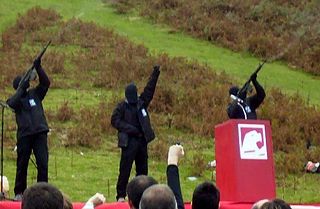
The Basque conflict, also known as the Spain–ETA conflict, was an armed and political conflict from 1959 to 2011 between Spain and the Basque National Liberation Movement, a group of social and political Basque organizations which sought independence from Spain and France. The movement was built around the separatist organization ETA, which had launched a campaign of attacks against Spanish administrations since 1959. ETA had been proscribed as a terrorist organization by the Spanish, British, French and American authorities at different moments. The conflict took place mostly on Spanish soil, although to a smaller degree it was also present in France, which was primarily used as a safe haven by ETA members. It was the longest running violent conflict in modern Western Europe. It has been sometimes referred to as "Europe's longest war".
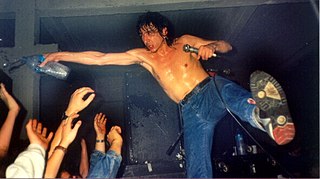
Basque Radical Rock was a musical genre born in the Southern Basque Country at the beginning of the 1980s and, although there was no specific event, it is considered to have ended in the last years of the decade. Basque Radical Rock bands were particularly influenced by punk bands like Sex Pistols and The Clash. It was considered an underground movement, born in opposition to the values proclaimed by Francisco Franco and spread by thousands of people who felt with the Spanish transition to democracy their Basque national and social aspirations were betrayed.
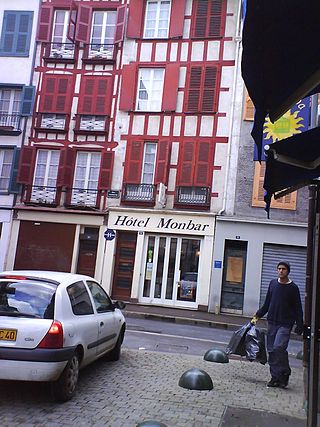
The Monbar Hotel attack was carried out by the Grupos Antiterroristas de Liberación (GAL), a Spanish state-sponsored death squad, on 25 September 1985 in Bayonne, Pyrénées-Atlantiques, France. The targets were four members of the Basque separatist terrorist group Euskadi Ta Askatasuna (ETA), whom the Spanish government believed to be senior figures in the organization, itself proscribed as a terrorist group in Spain and France. All four people were killed, with a fifth person, apparently unconnected to ETA, injured in the shooting. This represented the deadliest attack carried out by the GAL. Although two of the participants were apprehended shortly after the shooting, controversy surrounded the possible involvement of senior figures in the Spanish police.
David Pla Marín is a lawyer and Basque activist, who Spanish authorities believe to have been one of the three leaders of the Basque separatist group ETA at the time of the group's ceasefire declaration in October 2011. In 2000 Pla was condemned to six years imprisonment for planning an attack against the Mayor of Zaragoza, José Atarés. Pla is believed to be one of three people who read out the October 2011 ETA ceasefire declaration. He had previously been the leader of Basque separatist youth organisation Jarrai in the 1990s and had stood unsuccessfully as a candidate for Herri Batasuna in the 1995 local elections.

Teresa Toda is a Basque journalist.
Censorship in Spain involves the suppression of speech or public communication and raises issues of freedom of speech.
Vicente Zorita Alonso was a politician in Spain who was assassinated by the armed separatist group ETA. He was a candidate in the first elections to the Basque Parliament for People's Alliance.
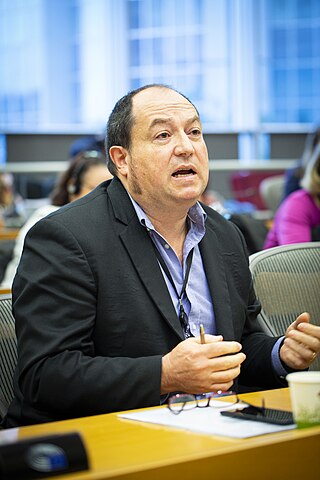
Joxe Pernando Barrena Arza is a Basque politician, former member of the Parliament of Navarre and member of the European Parliament for Spain.

Mertxe Aizpurua Arzallus is a Spanish journalist and politician from the Basque Country who currently serves as Member of the Congress of Deputies of Spain.

Maria Angeles Beitialarrangoitia Lizarralde is a Basque journalist and politician. She was previously a member of the Congress of Deputies of Spain and Basque Parliament, and mayor of Hernani.

Josu Muguruza (1958–1989) was a Basque journalist and politician who was assassinated in Madrid on 20 November 1989. Muguruza was among the leaders of Herri Batasuna, a Basque nationalist political party. He was about to serve at the Spanish Parliament for the party when he was killed.
Marey case is the name given to the trial for the 1983 kidnapping of Segundo Marey—one of the first victims of the Spanish government's dirty war against ETA—carried out by the so-called Grupos Antiterroristas de Liberación (GAL).















